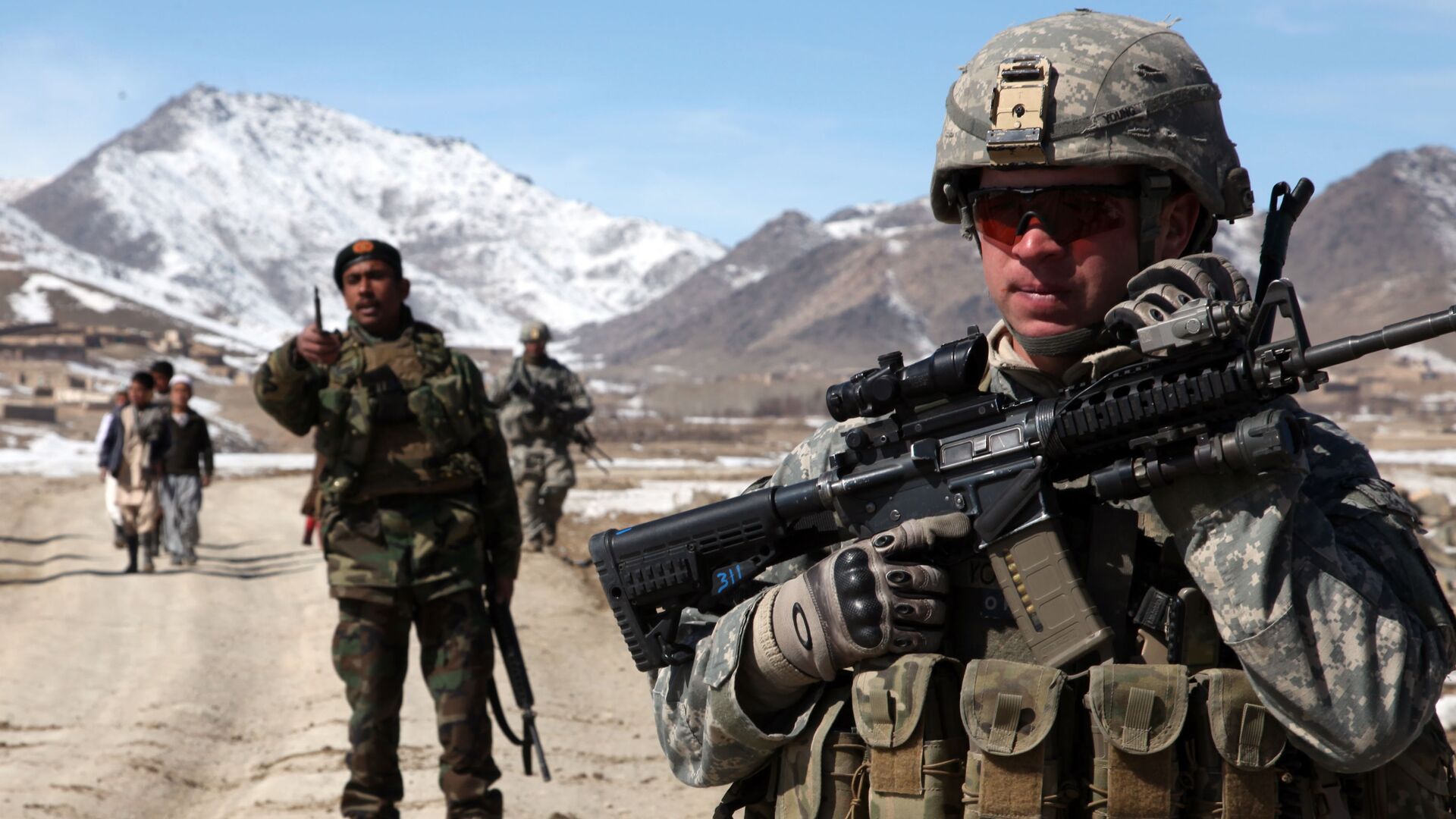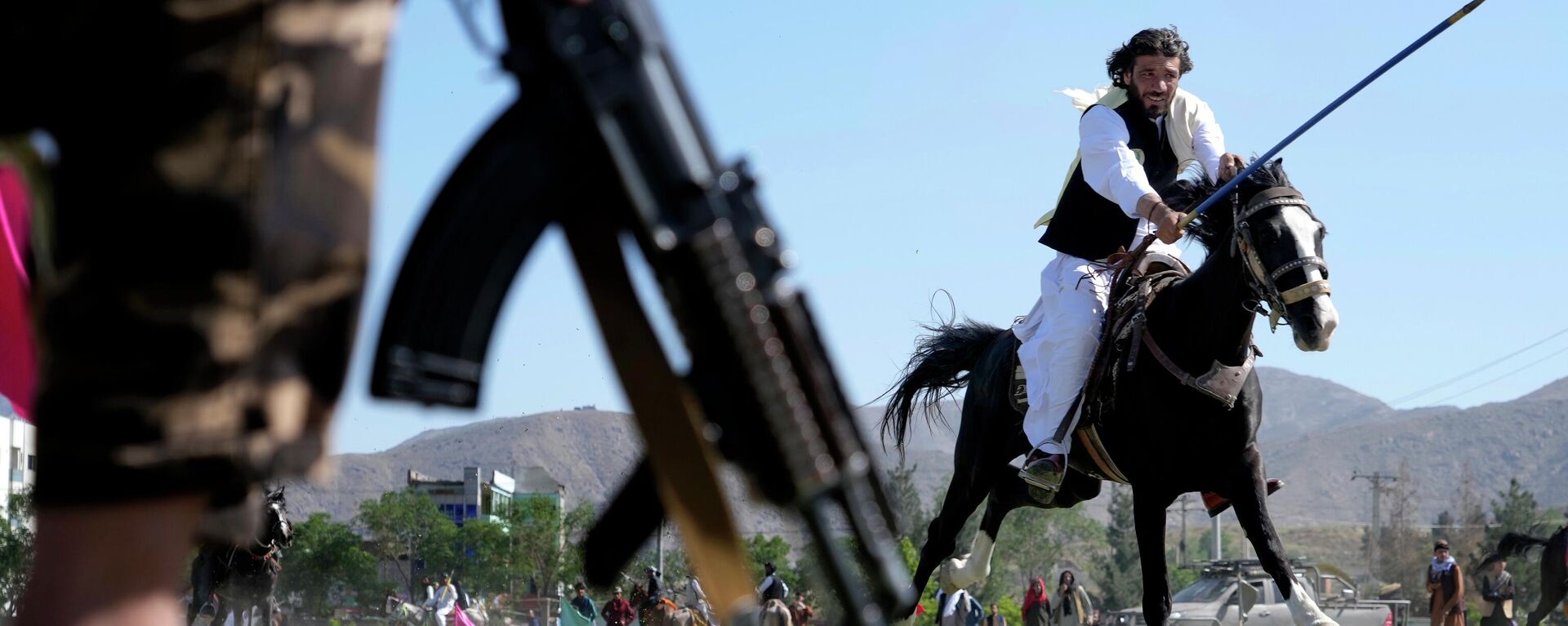https://sputnikglobe.com/20220812/us-lost-track-of-afghan-war-aims-says-retired-marine-general-1099521315.html
US 'Lost Track' of Afghan War Aims, Says Retired Marine General
US 'Lost Track' of Afghan War Aims, Says Retired Marine General
Sputnik International
US President Joe Biden broke the peace deal by delaying the US troop pull-out September 11. But The Pentagon then quietly pulled its troops out before that... 12.08.2022, Sputnik International
2022-08-12T17:00+0000
2022-08-12T17:00+0000
2022-08-12T17:01+0000
afghanistan
afghanistan war
kenneth mckenzie
us
https://cdn1.img.sputnikglobe.com/img/07e5/08/13/1083664997_0:0:3072:1728_1920x0_80_0_0_00be3ee36c53eb2131c69cf7fda63ff8.jpg
A recently-retired US Marine Corps general has told how Washington "lost track" of its reasons for maintaining the 20-year occupation of Afghanistan.In an interview with US public broadcaster NPR this week, General Kenneth Franklin McKenzie gave insights into the rushed and disorderly retreat from Kabul in August 2021 that left 13 US service-people and nearly 200 Afghans dead.McKenzie recalled how he flew to Doha in Qatar, the site of talks between the US and the Taliban*, on August 15 2021 to tell them of Washington's plans to evacuate its embassy and remaining citizens from Kabul.He told the militants: "We were going to execute a non-combatant evacuation operation — a NEO in our technical lexicon — and if they interfered with that, we would punish them severely"."In that very transactional, momentary period of time, they did not interfere with our withdrawal," which "probably allowed us to do it in the manner that we did it," McKenzie said.The interview reveals how delusional the Pentagon was about the prospects of delaying the guerrillas' takeover of the capital.Former US president Donald Trump's plan to pull troops out of Afghanistan in 2017 was blocked by the chiefs of staff and his Defence Secretary James Mattis, another former Marine Corps general.But as the situation continued to deteriorate for the western-backed government in Kabul, the Trump administration opened peace talks with the Taliban — prompting vehement attacks from the Democratic Party. A peace accord was finally signed in 2020, stipulating a deadline of May 1 the next year for all US troops to leave the country.In the period between the November 3, 2020, presidential election and Joe Biden's swearing in as president on January 20, 2021, Pentagon officials reportedly blocked Trump's orders to begin the withdrawal from Afghanistan — along with Iraq, Syria, all African countries and fellow-NATO member Germany.Biden unilaterally deviated from the peace deal by extending the timeframe to September 11 — the 20th anniversary of the World Trade Centre attacks the US used as pretext to invade Afghanistan. The Pentagon then quietly pulled its troops out before that date — leaving NATO allies' contingents in the lurch — before Biden hurriedly ordered thousands of troops back to Kabul as the Afghan National Army melted away and the Taliban marched into the capital. The general admitted that the pull-out should have begun much earlier, lamenting that many Afghans who collaborated with the occupying US forces were left behind.His other regret was over the 13 US troops killed in a suicide bomb attack blamed on the Afghan offshoot of DAESH*"Any time American soldiers, sailors, Marines lose their lives, you spend a lot of time thinking about decisions that you could've made and done differently," he said "So, yes, I think about that quite a bit from the perspective of, right at the end, 'What could we have done differently?'"McKenzie said responsibility for the debacle reached all the way up the "chain of command". Asked what went wrong with the US strategy over 20 years of occupation, McKenzie argued that it was Washington's attempt to impose Western ideas and forms of government on the country. "I think we took our eye off the ball in Afghanistan, why we were there, to prevent al-Qaida from striking our country," he said. "Over the course of our engagement over two decades, it grew into something much larger: an attempt to impose a form of government, a state, that would be a state the way that we recognize a state".While he did not believe the country could not be governed, the retired general believed "Afghanistan is ungovernable with the Western model that will be imposed on it".* The Taliban is an organization under UN sanctions over terrorist activities*Daesh, also known as ISIS/IS/Islamic State, is a terrorist group banned in Russia.
https://sputnikglobe.com/20220803/kirby-under-fire-after-he-takes-issue-with-premise-us-handed-afghanistan-to-terrorist-group-1098069944.html
afghanistan
Sputnik International
feedback@sputniknews.com
+74956456601
MIA „Rosiya Segodnya“
2022
James Tweedie
https://cdn1.img.sputnikglobe.com/img/07e4/08/1c/1080307270_0:3:397:400_100x100_80_0_0_7777393b9b18802f2e3c5eaa9cbcc612.png
James Tweedie
https://cdn1.img.sputnikglobe.com/img/07e4/08/1c/1080307270_0:3:397:400_100x100_80_0_0_7777393b9b18802f2e3c5eaa9cbcc612.png
News
en_EN
Sputnik International
feedback@sputniknews.com
+74956456601
MIA „Rosiya Segodnya“
Sputnik International
feedback@sputniknews.com
+74956456601
MIA „Rosiya Segodnya“
James Tweedie
https://cdn1.img.sputnikglobe.com/img/07e4/08/1c/1080307270_0:3:397:400_100x100_80_0_0_7777393b9b18802f2e3c5eaa9cbcc612.png
afghanistan, afghanistan war, kenneth mckenzie, us
afghanistan, afghanistan war, kenneth mckenzie, us
US 'Lost Track' of Afghan War Aims, Says Retired Marine General
17:00 GMT 12.08.2022 (Updated: 17:01 GMT 12.08.2022) US President Joe Biden broke the peace deal by delaying the US troop pull-out September 11. But The Pentagon then quietly pulled its troops out before that date before Biden hurriedly ordered thousands of troops back to Kabul as the Taliban* marched on the capital.
A recently-retired US Marine Corps general has told how Washington "lost track" of its reasons for maintaining the 20-year occupation of Afghanistan.
In an interview with US public broadcaster
NPR this week, General Kenneth Franklin McKenzie gave insights into the rushed and disorderly retreat from Kabul in August 2021 that left 13 US service-people and
nearly 200 Afghans dead.
McKenzie recalled how he flew to Doha in Qatar, the site of talks between the US and the Taliban*, on August 15 2021 to tell them of Washington's plans to evacuate its embassy and remaining citizens from Kabul.
He told the militants: "We were going to execute a non-combatant evacuation operation — a NEO in our technical lexicon — and if they interfered with that, we would punish them severely".
"In that very transactional, momentary period of time, they did not interfere with our withdrawal," which "probably allowed us to do it in the manner that we did it," McKenzie said.
The interview reveals how delusional the Pentagon was about the prospects of delaying the guerrillas' takeover of the capital.
"The plan was to try to get the Taliban to stop at a perimeter maybe 15 or 20 kilometres outside Kabul. We wanted them to not come any closer until we pulled our forces out," McKenzie said. But "by the time I got there, they were already in downtown Kabul, so that plan was no longer operative".
Former US president Donald Trump's plan to pull troops out of Afghanistan in 2017 was blocked by the chiefs of staff and his Defence Secretary James Mattis, another former Marine Corps general.
But as the situation continued to deteriorate for the western-backed government in Kabul, the Trump administration opened peace talks with the Taliban — prompting vehement attacks from the Democratic Party. A peace accord was finally signed in 2020, stipulating a deadline of May 1 the next year for all US troops to leave the country.
In the period between the November 3, 2020, presidential election and Joe Biden's swearing in as president on January 20, 2021, Pentagon officials reportedly
blocked Trump's orders to begin the withdrawal from Afghanistan — along with Iraq, Syria, all African countries and fellow-NATO member Germany.
Biden unilaterally deviated from the peace deal by extending the timeframe to September 11 — the 20th anniversary of the World Trade Centre attacks the US used as pretext to invade Afghanistan. The Pentagon then quietly pulled its troops out before that date — leaving NATO allies' contingents in the lurch — before Biden hurriedly ordered thousands of troops back to Kabul as the Afghan National Army melted away and the Taliban marched into the capital.
The general admitted that the pull-out should have begun much earlier, lamenting that many Afghans who collaborated with the occupying US forces were left behind.
"What we should have done was we should have begun to bring people out much earlier, rather than waiting until the very end," McKenzie said.
His other regret was over the 13 US troops killed in a suicide bomb attack blamed on the Afghan offshoot of DAESH*
"Any time American soldiers, sailors, Marines lose their lives, you spend a lot of time thinking about decisions that you could've made and done differently," he said "So, yes, I think about that quite a bit from the perspective of, right at the end, 'What could we have done differently?'"
McKenzie said responsibility for the debacle reached all the way up the "chain of command".
"That was a national decision made by the president, and we executed that decision," he said. "We had an opportunity to discuss it. We had an opportunity to give input. The president made a decision, and we executed it."
Asked what went wrong with the US strategy over 20 years of occupation, McKenzie argued that it was Washington's attempt to impose Western ideas and forms of government on the country.
"I think we took our eye off the ball in Afghanistan, why we were there, to prevent al-Qaida from striking our country," he said. "Over the course of our engagement over two decades, it grew into something much larger: an attempt to impose a form of government, a state, that would be a state the way that we recognize a state".
While he did not believe the country could not be governed, the retired general believed "Afghanistan is ungovernable with the Western model that will be imposed on it".
"We lost track of why we were there, and we did not keep the main thing the main thing," McKenzie concluded.
* The Taliban is an organization under UN sanctions over terrorist activities
*Daesh, also known as ISIS/IS/Islamic State, is a terrorist group banned in Russia.





